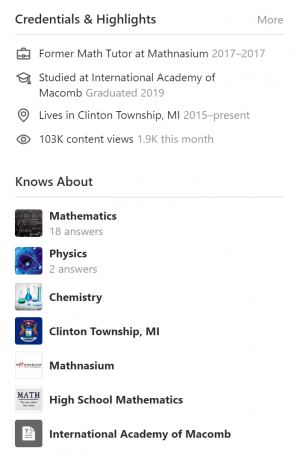Cooper Stevens
Contents
A Short Introduction
I am tasked with going incognito and gathering all the information on someone of particular interest. I don't have anything on this person except a name: "Cooper Stevens." In the interest of gaining recognition from potential employers and recruiters, I have spent a good deal of time in the last few years curating information sources about me, and deliberately publishing them publicly on the internet. In my investigation to find information about myself, I was especially contented to easily find those sources that I had curated (meaning that recruiters could also find them easily). However, upon digging further into the internet's search results, I found some remains left behind from my digital footprint (that is, information that I did not curate and publish, but rather information gathered on me just by merely having an active presence on the internet).
Search Engine
When I search my name "Cooper Stevens" on Google, the sources about me that come up on the first page of results are my Facebook, my LinkedIn, and my Next College Student Athlete (NCSA) profile. To my delight, these are three of the four profiles that I have taken the time to curate and publish for all the internet to see! My Facebook and LinkedIn profiles make public information about my age, education, work history, homes and cities I have lived in, and a few photos of me. Since I regularly update my information on these sites, this data is clearly up-to-date, stable, and _____. This is not all of the information these sites provide, however. On each of these sites, I have posted a link to my portfolio website.
My public portfolio website contains a lot more personal information about me, ranging from my significant other to my hobbies, to favorite vacations, to my academic research. This is by design so that I can easily refer potential employers to this website so that they may better get to know me as a person (as opposed to just as a candidate by my resume). This website also contains my contact information and a lot more pictures of me.
The next website that comes up in a Google search is my NCSA profile for tennis. This was a profile that I had set up during high school so that college recruiters could more easily find me and get in contact. It provides a different type of personal information, including my height, weight, my Universal Tennis Rating, and the position I played in high school. However, this information is out-of-date as these stats have changed over the last two years. Frankly, I had forgotten I made this profile. Perhaps this information is due to be updated (or deleted, as I no longer have a use for this recruitment profile).
My deliberate online identity
My Online identity as a result of my digital footprint
Despite the extreme ease of access of most everything you might look to find out about me, there still remained a few bits and pieces of data about me scattered throughout the internet. All of these sites that I will discuss (besides Facebook) were found on pages on or after the fifth page of search results! Needless to say, these were not so easy to find, especially when compared to my four curated profiles which all could be found with the first page of search results.
Nothing but a name
The first part of my digital footprint that I found in a search was located at the bottom of my Facebook profile page. Here is where it became clear that Facebook tracks and makes public information that I did not know Facebook was even tracking. Specifically, Facebook proclaims on my profile page that my favorite game is King of Thieves and that another of my favorite things is WLN Performing Arts. They couldn’t be more wrong. Not only do I not want these “favorites” of mine publicly available, but I do not know why they are being tracked by Facebook.
This prompted me to do some investigation into Facebook's data tracking policies. In this investigation, I found that Facebook advertises that “We store data until it is no longer necessary to provide our services and Facebook Products, or until your account is deleted - whichever comes first”[1]. Surely, remembering that I played a game called “Game of Thieves” does not constitute data that is “necessary to provide [Facebook’s] services.” Yet the data remains stored. With this, we can see that Facebook’s data policies are sufficiently vague that “necessary to provide service” can mean most anything, thus giving them reason to retain the data (that is, until I delete my account).
The next piece of my digital footprint that I stumbled upon was my Quora account - an account that I have not used in a year or two. Apparently, it has gained quite the following since I last checked it! Here, every single Quora question that I ever answered is linked. Looking through my answers, you can quickly see that I am a huge fan of recreational mathematics and physics, but you can’t tell much else from them. However, another part of my Quora account that is public is a list of my subject interests. I did not know that Quora makes personal interests publicly available - I figured Quora would keep these private and use them only to provide better content suggestions. This was a bit surprising.
Digging deeper into the pages of search results, I was startled by the abundance of data brokers that had information about me that I had not selected to make public. Some of this information included a list of my family members, a list of my neighbors, and even a personal email addresses that I have not explicitly shared online. I will point out, however, that some of these data brokers had information on me that was far from the truth. For example, one claimed that pkie****@ameritrade.com is my email address (it most definitely is not). The only correct information I found to be behind a paywall was the personal email address 0cpr****@gmail.com.
Honing in
Since I was able to figure out the education history of "Cooper Stevens" by only searching the name, I then was able to make my search more specific by adding on schools that Cooper Stevens has attended to the search query.
In this search query's first few pages of results, I started to find information about myself that I didn't even know about! For example, I found a University of Michigan Intramural Sports Disc Golf bracket that I took part in, I found many publications of my high school tennis team’s performance in tournaments[2][3][4][5], and I even found a long-standing 2-mile race record I hold at my middle-school. I even found my late grandfather’s and great-grandmother’s obituaries and grave sites.
The last few pieces of publicly available information that I found came directly from the University of Michigan. This information included my award of the 2020 William J. Branstrom Prize[6], and my current work schedule at the University of Michigan’s Math Lab. I did not expect my award to be so easily found, nor did I expect my work schedule to be publicly available.
References
- ↑ Facebook. (2021, January 11). Data Policy. Retrieved February 18, 2021.
- ↑ Macomb Daily Sports. (2016, August 26). ROUNDUP: Wins for Utica, Dakota, Cousino. MIPrepZone. Retrieved February 18, 2021.
- ↑ Macomb Daily Sports. (2015, August 31). Summaries for Aug. 31, 2015. MIPrepZone. Retrieved February 18, 2021.
- ↑ Macomb Daily Sports. (2015, August 24). TENNIS RESULTS 8/24. MIPrepZone. Retrieved February 18, 2021.
- ↑ Vest, Mark. (2017, September 25). Chippewa Valley boys tennis wins MAC Blue dual meet championship. C&G Newspapers. Retrieved February 18, 2021.
- ↑ The University of Michigan. (2020, March 15). "The University of Michigan's 97th Annual Honors Convocation". Ann Arbor; The University of Michigan. Page 114. Retrieved February 18, 2021.


